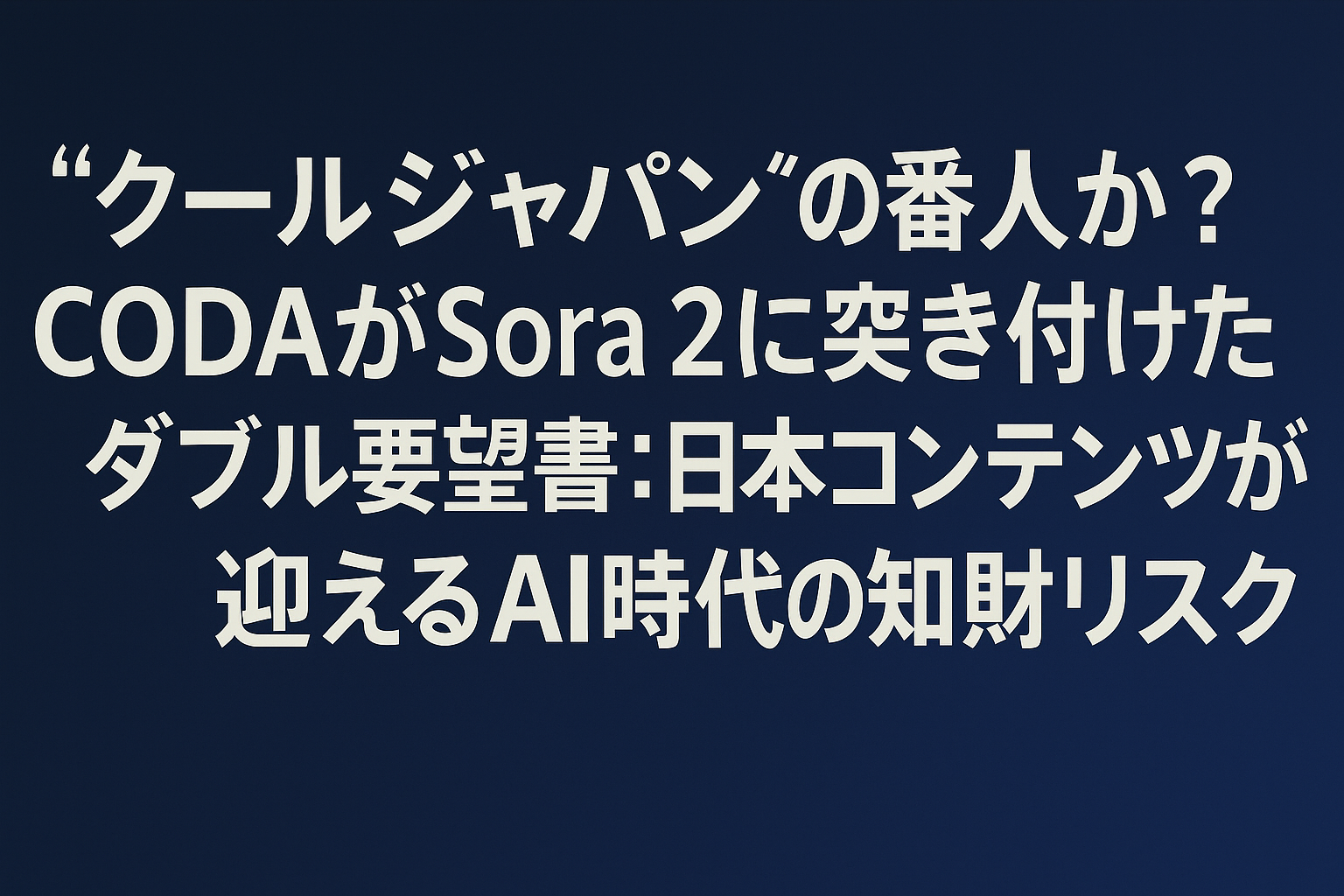On October 28, the Content Overseas Distribution Association (CODA)—a coalition of 36 member companies including publishers and animation studios—submitted a formal written request to OpenAI regarding its video generation AI, “Sora 2.”
CODA stated that it had “confirmed numerous instances in which videos generated by Sora 2 closely resemble existing Japanese content,” and demanded two things:
- to cease unauthorized training using CODA members’ works, and
- to respond sincerely to any copyright infringement claims or consultations from CODA members regarding generated content.
This move goes beyond a corporate-level dispute—it represents a signal of how Japan, as a “content nation,” may confront the rise of AI generation technologies.
This article examines the issue through three lenses: background, points of contention, and future implications.
Background: Why CODA Took Action Now
- Technical features and impact of Sora 2
Released on October 1, Sora 2 is a video generation AI that can produce motion more faithful to physical laws than its predecessor. Reports on social media claimed it generated videos resembling famous Japanese IPs such as Demon Slayer and Pokémon.
It has also been reported that Sora 2’s system allowed the use of copyrighted materials for training unless the rights holders opted out in advance.
- Japan’s position in the global content industry
Japan regards its cultural content industries—anime, manga, games, and publishing—as major export assets. CODA’s mission is to promote overseas distribution and prevent copyright infringement.
Therefore, the possibility that domestic IPs could be “generated or imitated” by AI without authorization raises not only rights-holder concerns but also significant issues for Japan’s national cultural and branding strategies.
- Legal framework and potential inconsistencies
CODA’s statement emphasized that under Japan’s copyright law, prior authorization is generally required for use, and there is no system allowing post hoc objections to exempt infringement liability.
Thus, the opt-out model employed by Sora 2 could be inconsistent with Japan’s domestic legal framework.
What the Request Reveals
- Use of existing content as training data
CODA argues that using existing copyrighted works (such as video footage, anime images, or manga art) for AI training could itself constitute copyright infringement as an act of reproduction.
Here, both “input” and “output” become points of contention—the unauthorized use of materials during training and the generation of outputs resembling or reproducing existing works.
Even when not directly copied, derivative or stylistic imitation (such as character likeness or art style) presents a gray area of “derivative generation.”
- Opt-out vs. opt-in frameworks
Reports indicate that Sora 2 operated on an opt-out basis—allowing use unless rights holders explicitly requested exclusion.
CODA and the Japanese government, however, emphasize that prior authorization (an opt-in system) should be the default.
This debate exposes a broader need for ethical and legal frameworks governing AI model operations.
- Cultural disparity and soft-power concerns
Some observers note that Sora 2 was unable to output U.S. IPs (like Disney or Marvel characters) but could generate content resembling Japanese franchises.
This raises concerns of cultural and industrial inequality—suggesting that Japanese content may be treated as less protected. Such dynamics carry implications for Japan’s soft power and global content influence.
- The need for rights-holder response and system development
CODA’s second demand—that OpenAI respond sincerely to copyright infringement claims—addresses the practical question of how rights holders can handle AI-generated “fan” or imitation content.
Issues such as takedown procedures, revenue sharing, usage monitoring, and liability assignment are becoming urgent.
Future Outlook and Implications
- Potential legal reforms in Japan
Triggered by this case, the Japanese government is advancing regulatory development under initiatives like the AI Promotion Act.
Possible measures include institutionalizing prior authorization, mandating transparency in training data, requiring filtering of generated outputs, and enabling rights-holder participation in monetization models.
- Strengthening negotiation power for content owners
Rights holders will need to develop new contract models defining whether and how their data can be used for AI training, how revenue is shared for generated outputs, and how character usage is managed.
For Japan’s anime and manga sectors—the pillars of the “Cool Japan” strategy—building international negotiation capacity is critical.
- Shifting approaches among AI developers
After Sora 2’s release, OpenAI CEO Sam Altman expressed “respect for Japanese creativity” and indicated plans to enable more granular control over character generation and potential monetization schemes.
This suggests a future shift toward license-based or co-creation AI models, though practical challenges—like managing datasets and monitoring outputs—remain substantial.
- Changing awareness among creators and users
As AI-generated and imitative content proliferates, creators (animators, manga artists, game developers) are becoming aware of the risks of their styles and characters being learned by AI.
Meanwhile, users need to understand the rights and responsibilities behind generating content based on beloved characters. Transparency will be key.
- Global influence and precedent-setting effects
Japan’s action may become a leading precedent in the “generative AI × copyright” debate, particularly for countries with strong cultural export industries.
For AI developers, this marks a phase where compliance with region-specific legal regimes—covering training data rights, output licensing, and liability—becomes indispensable.
CODA’s formal request embodies several deeper messages:
- Japan’s content industry seeks to uphold and strengthen principles of authorized use, contractual fairness, and creator protection in the AI era.
- Generative AI marks a transformative moment redefining copyright systems, cultural policies, and industry structures.
- As AI business globalizes, Japan aims not only to defend its own IP but also to take an active role in shaping international rules.
For those in the IP and content sectors—especially companies and creators with character-based assets in anime, manga, and games—this issue is no distant concern.
How training data are handled, how generated works are monetized, and how usage rules are clarified could all have profound impacts on future business models.

